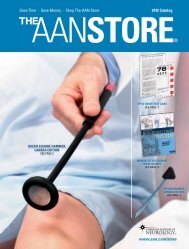Read the Case-Based Curriculum for Neurology Residents.
Read the Case-Based Curriculum for Neurology Residents.
Read the Case-Based Curriculum for Neurology Residents.
You also want an ePaper? Increase the reach of your titles
YUMPU automatically turns print PDFs into web optimized ePapers that Google loves.
"pseudoaddictive"<br />
or distressingly<br />
behaviors. (6) In essence, <strong>the</strong> problem of functional<br />
impairment reiterates <strong>the</strong> need <strong>for</strong> good training in pain management and opioid pharmacology.<br />
Moreover, unnecessary undenreatment of pain by physicians despite available<br />
alterantives, causes identifiable harms. First, undue fear of respiratory depression, addiction,<br />
functional impairment and justice concems that effectively block patient access to needed<br />
treatmentolerates pain in a way that shirks a physician's beneficence-based duty to promote <strong>the</strong><br />
well-being of each patient. Honorable individual physicians may disagree about <strong>the</strong> relative<br />
merits of a "biomedical" approach to opioids in CNP (that extrapolates from <strong>the</strong> favorable cancer<br />
experience with opioids) and a "biopsychosocial" approach (that favors functional treatment<br />
bolstering individual responsibility and minimizing opioid use), but this does not absolve <strong>the</strong>m of<br />
a duty to secure <strong>for</strong> <strong>the</strong> patients some reputable treatment. Second, tbe categorical withholding<br />
of opioids when all o<strong>the</strong>r reasonable attempts at analgesia have failed, tolerates and sustains<br />
potentially remediable disability due to pain. It may restrict rhe patent's freedom to pursue <strong>the</strong><br />
fullness of life, and to take pleasure in it. Third, deception even with beneficent motives<br />
constitutes unjustifiable patemalism and is morally wrong.<br />
The relevant and legirimate desires of patients with CNP who enter into fiduciary<br />
relationships with physicians are ro obtain relief safely and competently. While a physician may<br />
conscientiously decide that, on balance, <strong>the</strong> medical literature does not suppon opioids in CNp,<br />
<strong>the</strong> provides no warant to mislead <strong>the</strong> padent through silence or excessively negative verba.l<br />
framing of this option. There is, in fact, enough basis in <strong>the</strong> literature ro ar least discuss it as an<br />
altemative, and to disclose - along with any penonal rcservations - <strong>the</strong> names of rcputable<br />
physicians who use it. Deliberate withholding of in<strong>for</strong>mation about opioids <strong>for</strong> significant<br />
intractable CNP directly violates <strong>the</strong> patient's autonomy interest in making an in<strong>for</strong>med choice<br />
among clinically relevant and legitimate altemarives. It is every bit as imponant to grant <strong>the</strong><br />
patient <strong>the</strong> opponunity - as a mater of truth-telling and conscnt - to decline opioids <strong>for</strong> CNP as it<br />
is to accept <strong>the</strong>m. It is unethical <strong>for</strong> a physician ro withhold this in<strong>for</strong>mation when doing so<br />
promotes a personal monetary interest in an invasive or neurodestructive procedure-<br />
Fourth, <strong>the</strong> physician's justice-based duty to take <strong>the</strong> broader interests of society into<br />
account in decision making does not contradict or trump his or her beneficence-base duty to <strong>the</strong><br />
patient with CNP. Bemat defines <strong>the</strong> physician's duty to society as follows: " The ethical good<br />
that a patient accrues from <strong>the</strong> patient physician encounter is of paramount imponance, but it.<br />
must also be balanced against <strong>the</strong> harm o<strong>the</strong>r patients may sustain as an inevitable byproduct of<br />
<strong>the</strong> encounter."(l8) Provided that <strong>the</strong> conscientious physician concludes that <strong>the</strong>rc is no<br />
reasonable alternative to opioid <strong>the</strong>rapy ofa specific patient's CNP, that <strong>the</strong>rc arc no<br />
countervailing medical or psychosocial risk factors, and provided that thc patient has given valid<br />
in<strong>for</strong>med consent and promised to faithfully adhere to tbe <strong>the</strong>rapeutic contmct, <strong>the</strong>n sciety and<br />
o<strong>the</strong>r individuals in it incur no meaningful, dircct or inevitable risk of harm. Physician should<br />
be aware of <strong>the</strong> porcntial conflict of intercst between <strong>the</strong>ir personal aversion to assuming possible<br />
risks in prescribing opioids <strong>for</strong> CNP, and specific patients' claim <strong>for</strong> exactly that treatment <strong>for</strong><br />
<strong>the</strong>ir o<strong>the</strong>rwise-intractable pain.





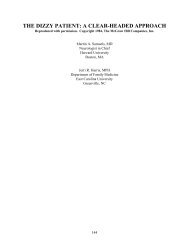
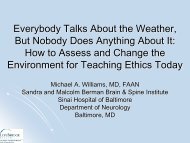
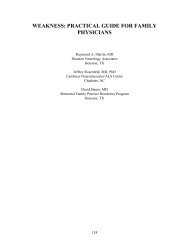
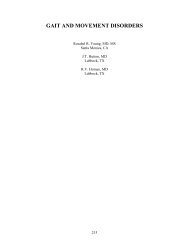
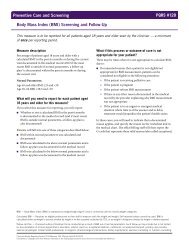

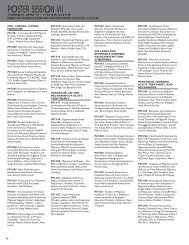
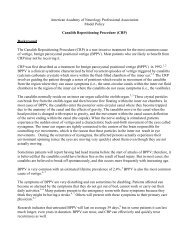
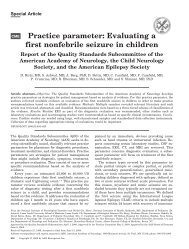
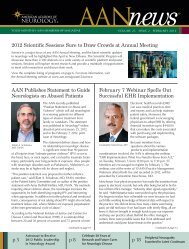
![[Click here and type date] - American Academy of Neurology](https://img.yumpu.com/8582972/1/190x245/click-here-and-type-date-american-academy-of-neurology.jpg?quality=85)
